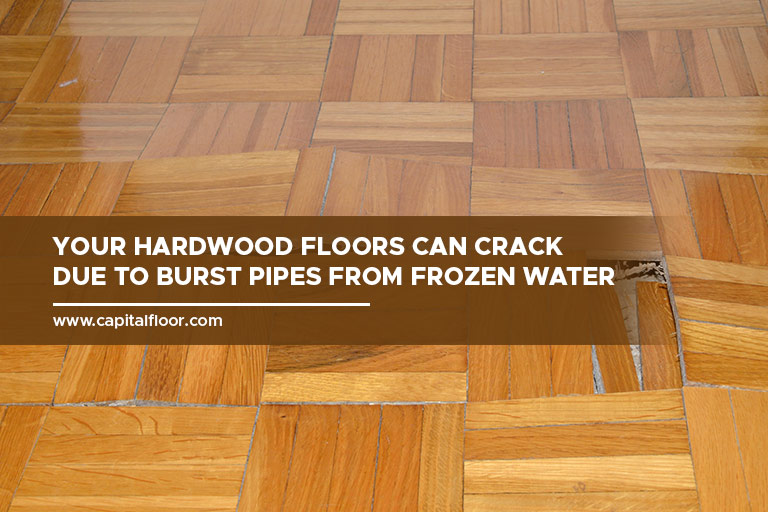Our showroom is open to the public. Please click HERE for more details.
Our showroom is open to the public. Please click HERE for more details.
Hardwood floors can provide your home with aesthetic appeal and warmth. They must be properly cared for so that this beauty may endure. This is particularly true when the air is dry and snow begins to accumulate inside your home.
Snow, salt, ice, and other elements are extremely harmful to hardwood floors. With the proper practices and advice, it is easy to avoid damage. Here are some of the potential damage and provide preventative measures against their occurrence.

Mould growth can result from water that has been tracked onto hardwood floors over time, particularly if the water has not been thoroughly mopped up. Additionally, this may induce floorboard warping and swelling. Winter is a prevalent season for such occurrences due to the ease with which dissolved snow can be tracked into water.
Sodium chloride, also known as rock salt, can be exceedingly abrasive on wood floors if tracked in from the exterior. This results in damage and blemishes to the finish of your wood floor. One potential solution to mitigate this issue is to station floor mats at each entrance, where visitors could dry their feet before entering. This will retain the majority of ice and salt, preserving the lustre of your floors.
Salt is detrimental to hardwood surfaces due to several factors. To begin with, if the crystals are carried across the floor, they may cause surface scratches due to their typically jagged and rough texture. This may happen more frequently than expected, given that crystals can become entangled in footwear and other similar objects. Additionally, salt is composed of calcium chloride crystals, which means that the particles can cause chemical damage to the floors.
Gaps in hardwood floors during the winter are an additional issue. As a result of the air drying out when a home is heated, the timber flooring releases moisture and contracts. As a consequence, conspicuous fissures and fractures manifest between the flooring. While repairing hardwood floor splitting is relatively straightforward, it should be avoided.
Throughout the year, grime and other particles that enter your home can find their way into your floors. Unfortunately, water from thawing snow and ice is also a concern during the winter. Neglecting to address this water effectively may result in the warping of your wood floor and subsequent harm to the adjacent boards.
Additionally, the floor surface may become scratched due to the presence of grime and other small debris in your home. Although this may initially appear to be harmless, it will quickly permit moisture to infiltrate. Mopping and sweeping frequently is the most effective method for removing water and detritus.
Although lower temperatures may not cause direct damage to hardwood floors, a ruptured pipe can cause significant damage. There is a possibility that a pipe may crack from freezing. The application of such water to hardwood surfaces may result in irreparable cracking and warping.

Removing your shoes before entering your home is one of the most effective preventive measures you can employ to safeguard your floors, despite its apparent simplicity. Consistently performing this action will effectively hinder the accumulation of snow, water, and precipitation on your hardwood floors. Keep this in mind the next time you find yourself neglecting to take off your shoes; doing so can mean an entire world of difference.
Wood floors can be prevented from gapping, shrinking, and splitting with the aid of a home humidifier. This facilitates the regulation of indoor humidity, which is especially beneficial during the winter months when the air becomes drier. By using a humidifier, you allow the wood floors beneath you to breathe.
Over time, extreme temperature fluctuations in your home can cause hardwood floor damage. Constantly blasting heat can reduce the amount of moisture in a room, while shutting windows and doors expeditiously dries the air. Consequently, the heat will initiate the process of moisture absorption from the flooring.
Once or twice per week, at the latest, sweep and vacuum your parquet floors as part of routine floor maintenance. This is particularly critical in heavily travelled areas.
Since improper cleaning of vinegar frequently results in the formation of its residue, it is not a suitable cleaning agent. When scrubbing hardwood floors, a cleaner formulated specifically for the floor’s finish is the most effective method.
Water is extremely damaging to wooden surfaces; therefore, its use should be restricted. To scrub your floor, refrain from using a steam mop or a cloth saturated in water. If you must use a mop and water, ensure that it is completely dry and not drenched. Prevent the use of abrasive cleaning agents, including detergents and oils containing ammonia. Furthermore, hardwood floors can be harmed by acidic substances like lemon juice and vinegar.
A further straightforward and effective preventative measure for hardwood floors is to wipe up puddles immediately after accidental spillage. As opposed to allowing it to remain unnecessarily long, immediately rinse it off within a few seconds. It is preferable to have this cleared up as soon as possible.
Pads should be placed beneath the legs of furniture, or slip-on leg coverings should be purchased. These can aid in preventing scuffing, scratching, and other indications of floor deterioration.
Winter cleaning maintenance is frequently more critical than summer cleaning maintenance, particularly in regions with severe frigid winters and substantial snow and ice accumulation. A cleaning professional should be consulted regarding your contract to ensure that you are receiving the most efficient cleaning strategy. Following these tips can ensure that your hardwood floors endure the winter season. Ensure that you exercise constant caution and properly maintain your floor.
Are you interested in revitalizing your home through hardwood floors in Toronto? For further information regarding Capital Hardwood Flooring and the products we provide, please visit our website or give us a call at 416-536-2200